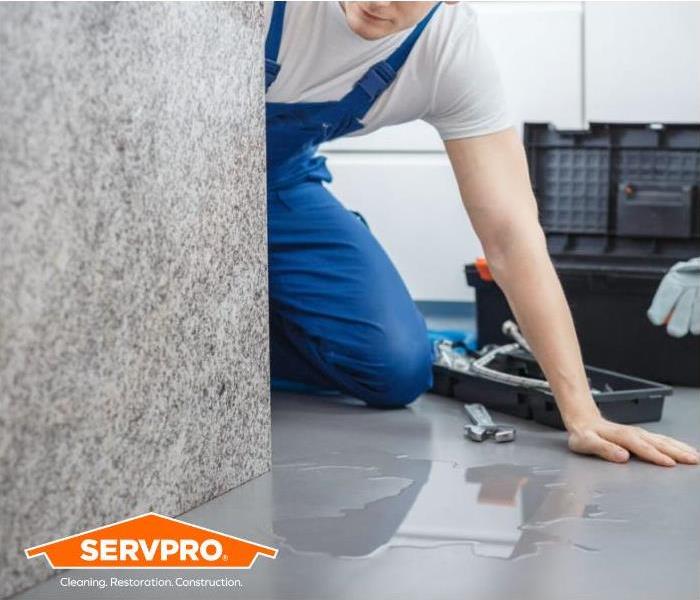Appliances Can Cause Water Damage to Your Home | SERVPRO® of Montgomery
5/25/2022 (Permalink)
 “SERVPRO® of Montgomery is ready for when disaster strikes! Call us today at 334.284.1612 for water mitigation in your home.”
“SERVPRO® of Montgomery is ready for when disaster strikes! Call us today at 334.284.1612 for water mitigation in your home.”
When you hear "water damage," people often think of flooding because of a natural disaster. While these two examples are possible, did you know that water damage is usually caused by broken or leaking appliances?
If an appliance is connected to a water line, it can cause costly damage to your pocket. Dishwashers, refrigerators, washers, water heaters, and toilets can all leak and destroy your property. Let us take a moment to discuss what this means for your home and how we can help you prevent a water disaster.
Maintenance is Key
Everyday appliances require regular maintenance. They rarely receive the attention they need to avoid burst pipes, leaks, and other problems that result in damage.
Dishwashers have a hot water line that is prone to leaks near or at the connection, a door gasket that should remain tight, and a drain that must remain clear. If any of these become loose or worn over time, it can quickly lead to flooding in your home. It is good to check these every few months to ensure all is working correctly.
Washing Machine failures are common when regular maintenance falls by the wayside. These machines can vibrate violently or move during a wash cycle which can cause hoses to be subject to damage. The hot and cold-water hoses should be replaced every four to five years even if they look like they are in good shape.
Water Heaters hold and continuously transfer water from installation to replacement. This results in normal sediment buildup in pipes, fixtures, and the tank itself, leading to massive loss if not maintained. Nothing causes more damage to your home or business than a burst water heater. Water heaters should drain once a year to eliminate sediment buildup on the bottom of the tank. Check the area around the base periodically. When the bottom becomes corroded, the whole tank may give out, causing a steady stream of running water.
Toilets can cause water damage if the wax seal on the bottom wears out or the inlet hose develops a leak. Toilets leaks are one of the most common reasons SERVPRO® receives calls for help. The hoses used for cold-water inlets are generally substantial, but you should check the connecting ends for leakage at least once a year. Toilets typically do not flood an entire home or business, but they can still cause severe damage. By checking the connections regularly, you can significantly reduce the chances of a leak.
Refrigerators and Icemakers can leak inside the appliance or on the surrounding floor. The hoses can warp over time, causing leaks. Just because the appliance is running does not mean it is safe. Beware of mold growth inside your refrigerator and freezer. Mold growth can occur from insulation slowly drying once plugged back in. It is good to clean your ice maker routinely. Throw out the ice and flush the dispenser for three to five minutes. Make sure to wash and sanitize the bins.
How to Prevent Leaks
To avoid water damage in your home or business, use these preventative steps for plumbing, fixtures, and appliances:
- Inspect all water hose connections to ensure they are snug.
- Look for wet spots; this may signify a soon-to-burst pipe or loose connection.
- Check dishwasher hoses for leaks.
- Clean and check the refrigerator drip pan and ice maker connections.
- Make sure the dishwasher float switch is clean and not corroded. This mechanism tells the dishwasher when to stop filling with water. A broken switch can lead to significant flooding.
- Inspect drains under the sink. If you notice any discolored or warped flooring materials, look for leaks around the sink's base.
- If you have noticed your sink is clogged, and the water is not draining correctly, you may have a blocked drain. Drains should be clean and always be kept clear.
- Annually look around the base of each appliance for leaks, discoloration, and warping floor materials. If you notice warping materials, you may have a leak where you cannot see them.
Homeowners should know where water supply lines are and how to shut them off properly. It is good to educate anyone who lives in the home, so they know how to shut off water valves if you are not nearby.
Should you have a flood in your home, avoid walking through the floodwater. Your home is full of electrical outlets and equipment that can become dangerous when exposed to water or excessive moisture. Appliances can short circuit or start a fire. Moreover, it can cause user harm. A professional should always inspect appliances before use after a flood has occurred in your home.
Gas lines or your water heater may have also shifted. A rotten-egg odor is a huge red flag that gas is leaking. If you smell this odor, you need to leave your home and immediately call 911. Do not switch on any lights, use anything that conducts electricity, or create an open flame. Any of these can ignite the leaking gas and cause a deadly explosion.
When flooding occurs in your home, call a professional to ensure your environment is safe. SERVPRO® of Montgomery is waiting to make it "Like it never even happened."






 24/7 Emergency Service
24/7 Emergency Service